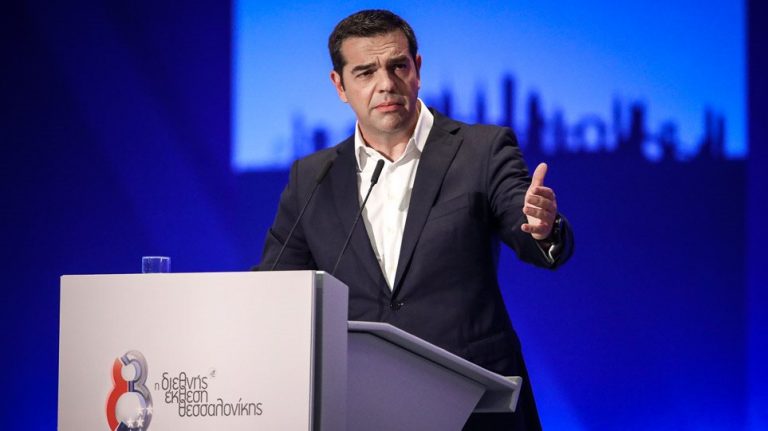Greek Prime Minister Alexis Tsipras repeatedly underlined his “vision” of a Greece in the future in the post-bailout period, speaking on Saturday evening from Thessaloniki on the occasion of the opening of the annual 83rd Thessaloniki Trade Fair event, a setting where Greek premiers have traditionally delivered state-of-the-economy speeches and laid out their economic plans.
Tsipras, whose government is trailing by a large margin in opinion polls and who has seen his own personal approval ratings steadily drop, defended his decision to give in to creditors’ demands in 2015, the precursor of the third memorandum in July 2015. “This is the first time that I can say that in 2015 we made difficult decisions and we were justified.”
On the issue of whether another round of agreed-to pension cut would be implemented as of January 1, 2019, Tsipras avoided pledging any unilateral actions, in an effort to stay in line with the country’s creditors. He said fiscal targets are being met, and therefore the looming social security reduction is unnecessary, something he added will be made clear to creditors – i.e. European institutional creditors.
Speaking at the same venue where he once, as the main opposition leader, detailed an anti-austerity, anti-bailout and spending-laden, the “Thessaloniki program”, on Saturday he referred to another plan, which he called “Fair Growth”.
He said his government aims to decrease contributions paid by self-employed professionals and professional farmers, as well as to reinstate stricter labour market regulations.
In echoing past Greek prime ministers who spoke from the same venue over past decades, he promised an improved public administration in “red-tape”-plagued Greece as well as expedited court decisions, as well as simplification of procedures to set up new businesses.
The Greek PM even referred to an emphasis on finally creating a unified and functional and registry in Greece, one of the few, if not the only, country in the advanced world without such an entity.
Tsipras formally announced a return of (obligatory) collective bargaining agreements in the country and the principle of extending such agreements when the benefit leans towards wage-earners.
He also confirmed that the government wants to raise the minimum monthly wage scale, as of 2019, while including a caveat: “following the conclusion of consultations with all involved parties”.
He promised that by the end of the year, his government will have legislated on the reduction of the property tax (ENΦΙΑ) by 50% for almost 1.2 million low-value properties and 30% for two phases in the 2019 and 2020.
On Greece’s relations with the US, which was the honoured country at the Trade Fair, the PM made reference to the deep ties between the two nations, stressing the strong strategic relationship. “…the struggles for common values at important moments in history. From the struggle for independence against colonialism and the proclamation of independence. Until the struggles to abolish slavery with the seal of President Lincoln. And from the common struggles against fascism and Nazism. Until the great battles to secure and respect human rights against racial discrimination.”
In a bid to reverse what’s been called Greece’s version of “brain drain”, Tsipras promised subsidised job spots for 10,000 scientists and high-skilled young professionals, while even pointing to some of the sectors the state will subsidize: manufacturing, agri-business and “new technologies”. At the same time, he promised 5,500 new positions in Greece’s public sector, and incentives, such as lower income taxes and social security contributions, for young professionals that repatriate – again, as of 2019, an election year.
Ask me anything
Explore related questions





